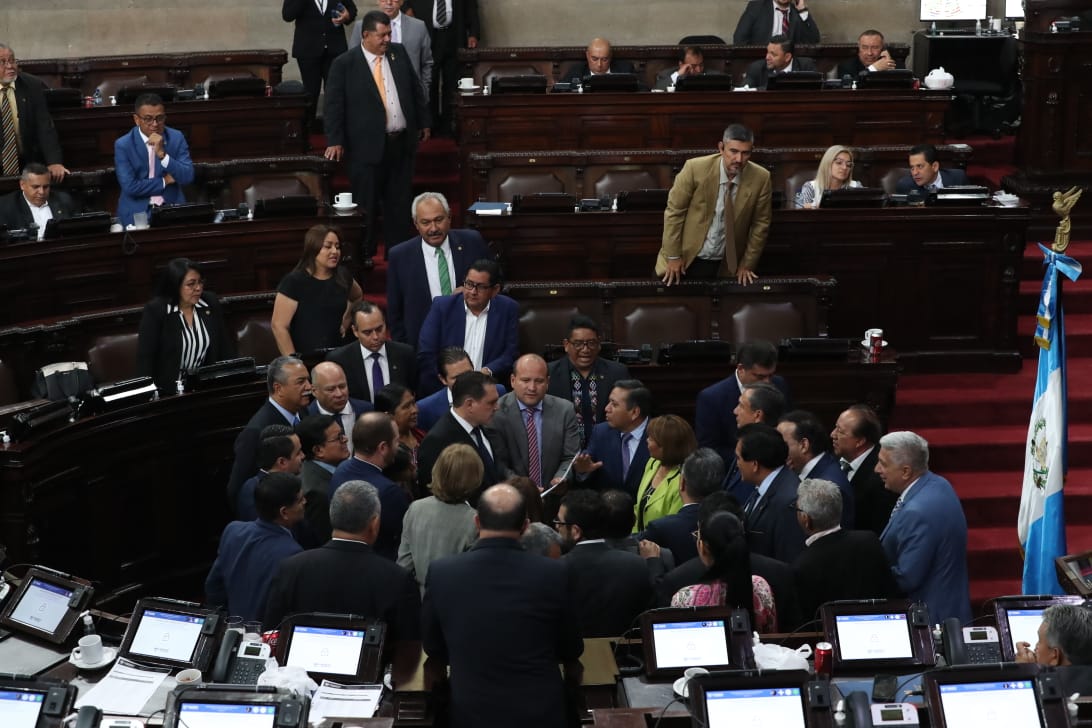Global Courant 2023-04-27 16:00:34
For the plenary session this Wednesday, April 26, initiatives focused on benefits for the elderly were outlined, on reforming the preventive detention regime and it was proposed to create a commission to supervise the Palín-Escuintla highway. None of the points advanced within Congress.
The deputies were summoned at 12 noon, however, the session began with just the minimum number of deputies 40 minutes later.
Deputy Cristian Álvarez, a member of the Commitment, Renovation and Order (Creo) bloc, proposed that the plenary appoint a commission to oversee the Palín-Escuintla highway. That’s where the debate started.
According to Álvarez’s arguments, this commission would serve to prevent the State from being affected by receiving a work, which according to the congressman, must have a guarantee of at least two years.
While the deputies began to discuss their points for and against regarding the proposal of the deputy from Creo, another point came up for discussion: the approval of initiative 5563 due to national urgency, which refers to reforms to the civil passive class law of the State.
The proposal reached Congress in 2019 under number 5563. Since then it had not been the subject of discussion until yesterday when they were preparing to approve it in the first debate.
The deputies were activated and divided into two blocks, one in favor and one against, the express approval of the aforementioned law.
The parliamentarians vociferated their commitment to retirees and the need to dignify their retirement payments, however, after several hours of argument, the session ended without approving anything.
For this session, the official party, Vamos, did not agree with approving the initiative that would increase the amounts for state retirees as a matter of national urgency. Carlos Roberto Calderón told the plenary session that he was in favor of supporting the elderly, but that this initiative needed to be discussed and approved in three debates.
populist proposals
Analysts point out that the proposals that are now being discussed in the Legislative Branch have a particular context, since legislators sometimes seek to promote initiatives of a social nature to capitalize on votes due to the electoral campaign. Prensa Libre recently confirmed that 78% of the current deputies are seeking re-election.
Deputy Álvarez, when he did not get support to create the inspection commission for the Palín-Escuintla highway, formally insisted again with the presentation of the same proposal and again stopped the progress of the legislative agenda.
Boris España was acting president for the plenary session because President Shirley Rivera traveled to Taiwan on the official visit of President Alejandro Giammattei to that country.
The acting president before Álvarez’s second attempt, summoned all the heads of blocks to the center of the chamber to reach an agreement. After several minutes, Spain explained that the Legislative Directorate would evaluate documents to determine who is responsible for monitoring the road section.
From there the discussion returned to the Chamber. Rubén Barrios, deputy from Valor, criticized the fact that no deputy wanted to join the audit commission, not even the deputy who proposed it, which opened a direct discussion with the representative of Creo.
“We cannot continue playing with the people of Guatemala,” said Congressman Barrios, after a brief silence. “If you want, name me in the commission and I will audit you alone, so that you learn well,” Barrios challenged Álvarez.
The aforementioned congressman took his cell phone and began recording Barrios, who replied: “you are a coward, look for phones, that’s what you are, a coward.”
Spain called to order both deputies who were still in discussion and realizing that the attendance of deputies was minimal suspended the session without Congress approving a single item on the agenda of the only session to approve initiatives that were scheduled for the week.
One step away from being law
The agenda that was suspended yesterday includes initiative 6185, which contemplates reforms to the Penal Code to promote early release for inmates who are 75 years of age or older.
The initiative is also populist in nature, according to the analysis of Oswaldo Samayoa, an analyst on security issues, who pointed out that there are previous resolutions that have told Congress that it cannot compromise the criteria of judges, due to the independence judicial.
The organization Diálogos and the Center for National Economic Research (CIEN) also agree that the law under discussion would only benefit a minority, a particular group.
“It is a reform that is focused on people, above all, over 75 years of age who are deprived of liberty. According to data from 2018, there were 57 elderly people who were deprived of their liberty,” said María del Carmen Peláez, a Diálogos researcher.
For her part, Corinne Dedik, from the Center for National Economic Research (CIEN), pointed out that the issue deserves a broader discussion, because “pretrial detention is definitely an issue that must be reformed, that must be discussed, but a Integral reform”.
Another initiative that was on the agenda this week was the approval of the law for the application of the recourse of grace or pardon to the death penalty, which has been in second reading for two weeks, although it has been the subject of media discussion by some presidential candidates who They offer the death penalty in their government plans.
This Thursday a second plenary session has been convened with an agenda that occupies five questions.




